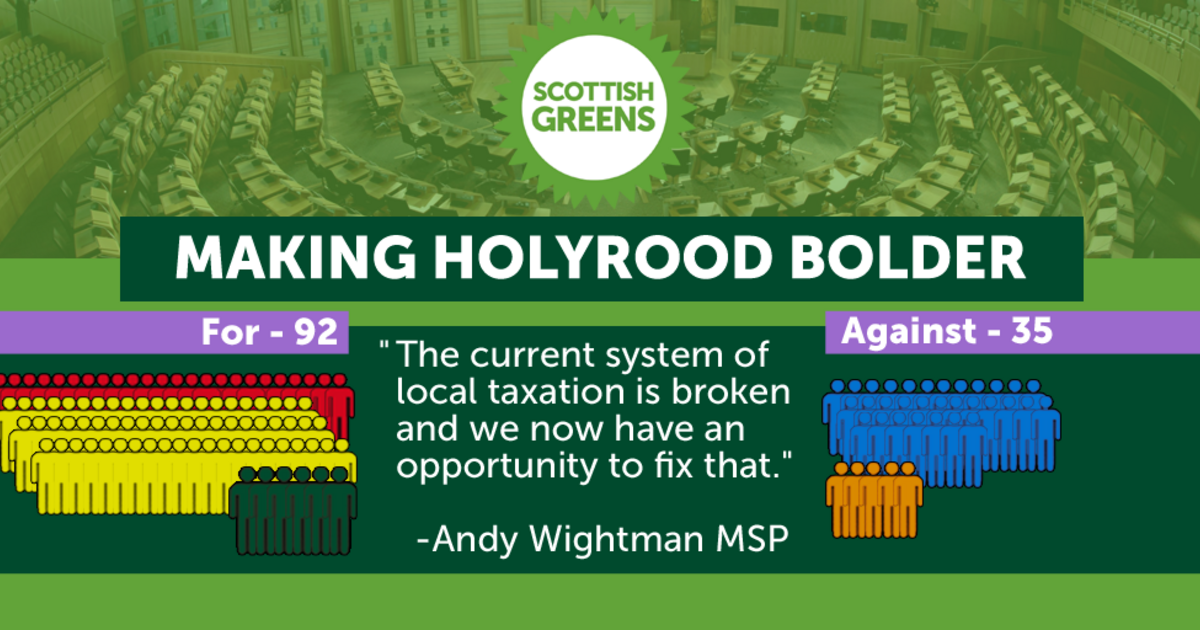Minority government could mean better dialogue, law & budgets

Many people in Scotland will be disappointed with the modesty of reforms to the council tax agreed by MSPs this week.
The Scottish Government often talks about how decisions on Scotland’s future would be best taken at the Scottish Parliament rather than at Westminster – and Greens agree.
So it was exasperating to see Holyrood struggle to even make a decision, with the SNP playing a strange game and threatening to vote against their own changes to the council tax – a modest adjustment that we accept will raise more money for local authorities to spend on the services we depend on – rather than face modest criticism for their timid proposal. In the end the Green criticisms of these tepid reforms were agreed, but then SNP, Greens and Labour united to back this tiny step in the right direction.
The clearest thing about this debate, however, is that council tax should be scrapped.
With minority status, the government must expect fair criticism from time to time. Other opposition parties supported our amendment, which in no way blocked the changes to council tax bands. The Green amendment had the aim of putting on record the serious concerns expressed across the political parties, local government itself and the public service unions. But we always made it clear that we’d back the new tax bands themselves, because the change was better than nothing.
The cross-party Commission on Local Tax Reform, which was established by the Scottish Government and which also involved COSLA, the Greens, Labour and the Liberal Democrats (the Tories having refused to take part) was never going to resolve every detail about how to replace the council tax. But its remit was clear: To examine alternatives that would deliver a fairer system of local taxation.
It didn’t settle on a single alternative, recognising that there were several options still on the table. But in the first few pages of its report, it set out the reasons why our antique system of local tax is so broken, and its central recommendation was for this system to end.
Council tax is based on valuations more than a quarter of a century old. Most households are in the wrong band. Properties in the highest band are worth, on average, 15 times those in the lowest, but they pay only three times as much. As this situation has dragged on, housing has become ever-more unaffordable for many people. Those in the highest-value homes are sitting back on vast unearned equity wealth while huge numbers of young people wonder if they’ll ever be able to afford a home.
Last year, Greens proposed changes to local taxation as short-term, emergency measures to reverse the cuts imposed on Scotland by the UK Government. Achievable immediately, these would have raised as much extra revenue as Labour’s 1p income tax plan, but without the implausible requirement of setting up an entirely new rebate mechanism in the space of a few weeks.
I never expected the Scottish Government to fully agree to our proposals. But what shocked me most was how they then took elements of these emergency measures, watered them down and announced them as a substitute for actually replacing the council tax.
When the SNP do the right thing, the Greens always try to give them credit where it’s due. But honestly, this just isn’t the bold agenda Scotland needs right now. Council tax doesn’t deserve a reprieve, and I don’t think we can afford five more years at Holyrood in which we just let it limp along. Greens will continue to campaign for its wholesale replacement, with a modern and efficient system that empowers local government and helps build a fairer, more equal society.
Councils raise only 12 per cent of their funds themselves when the European norm is 50 per cent. The autonomy major European cities have is the envy of councils in Edinburgh, Glasgow and Dundee.
One of the core principles of the Scottish Green Party is a revitalised local democracy. We want all decisions that can be made at a local level to be made at a local level. Just as decisions about Scotland are best made by the people who care most about Scotland – the people of Scotland – we think the same for decisions about the people of Kilmarnock, Montrose, Aberfeldy and Perth making decisions that affect their own lives.
The Scottish Government must now work on its budget over the coming weeks.
It should be a budget that goes further in raising revenue from those who can afford it, and saving money for everyone on low incomes. Minority government will mean ministers lose votes occasionally, but it could also mean better dialogue, better law and better budgets.
This article first appeared in the National
